- Home
- Cassandra Clare
Ghosts of the Shadow Market Page 7
Ghosts of the Shadow Market Read online
Page 7
“Leopolda is a bit of an odd one,” Malcolm said. “I met her while I was traveling in Vienna. I don’t think she leaves her city often. She seems to get around with some famous mundanes. She is . . .”
He hesitated.
Yes?
“. . . more connected, I suppose, to her demon side than her human side than most of us are. More than me, certainly. She makes me feel uneasy. I’m glad that you came over. I was looking for a way to politely escape.”
Jem looked in the direction that Leopolda had gone. Someone more connected to the demon side. . . .
That was someone he might need to speak with. Or watch.
* * *
Anna lay in her bed, eyes closed, trying to will herself to slumber. In her mind, she was dancing again. She wore her imaginary finest evening wear—a suit of deep gray, a waistcoat of sunny yellow with matching gloves. On her arm was Ariadne, as she had been tonight, in the blue dress.
Sleep was not coming. She pushed herself out of bed and went to the window. The night was warm and close. She had to do something with herself. Her brother’s clothes were still in her wardrobe. She picked them out and smoothed them on the bed. She had planned on returning them, but . . .
Who would miss them? Not Christopher. Their laundress might, but no one would question that Christopher might simply lose his trousers, possibly in the middle of a crowded dance floor. And the older clothes—he wouldn’t need them, not at the rate he was growing. The trousers were too long, but they could be hemmed. The shirt could be nipped in at the back. A few simple stitches were all it would take.
Anna was not a natural seamstress, but like all Shadowhunters, she possessed the basic skills to repair gear. She couldn’t have made lace or done precise tailoring, but she could get this job done. She tacked his shirt and waistcoat in the back to make them fit and flatter her torso. The jacket was a bit more complex, requiring tucks on the back and the side. The shoulders were a bit wrong, and the effect a bit triangular, but all in all it was a passable effort. She practiced her walk in the fitted trousers, now that they no longer scraped the ground.
She had always loved gear as a child, its easy maneuverability, the way it allowed her to move unfettered. She had always been surprised that other girls, unlike her, didn’t resent being pressed back into dresses and skirts when training was over. That they didn’t resent the loss of freedom.
But it was more than the comfort of the clothes. In silks and ruffles Anna felt silly, as if she were pretending to be someone she was not. When she wore dresses out on the street, she was ignored as a gawky girl, or stared at by men in a way she did not like. She had been out in her brother’s clothes only twice, both times late at night—but oh, women looked at her then, smiling women, conspiratorial women, women who knew that in donning the clothes of men, Anna walked in their power and their privilege. They looked at her soft lips, her long eyelashes, her blue eyes; they looked at her hips in tight trousers, the curve of her breasts under a man’s cotton shirt, and their eyes spoke to her in the secret language of women: You have taken their power for your own. You have stolen fire from the gods. Now come and make love to me, as Zeus made love to Danaë, in a shower of gold.
In her mind’s eye, Anna bent to take Ariadne’s hand in hers, and the hand seemed real.
“You are so beautiful tonight,” she said to Ariadne. “You are the most beautiful girl I have ever seen.”
“And you,” Ariadne answered in her mind, “are the most handsome person I have ever known.”
The next day, Anna spent two hours writing a note to Ariadne that ended up reading:
Dear Ariadne,
It was very nice to meet you. I hope we can train together sometime. Please do pay a call.
Regards,
Anna Lightwood
Two entire hours for that, and a pile of drafts. Time no longer had meaning, and might never have meaning again.
In the afternoon, she had plans to meet her cousins James, Lucie, and Thomas, along with Matthew Fairchild. James, Matthew, Thomas, and Christopher were inseparable, and always meeting at a house or a hideout. They were invading her aunt Sophie and uncle Gideon’s home today. Anna attended their little gatherings only on occasion, as did Lucie—the girls had many occupations to amuse themselves with; today, she desperately needed something to do, something to moor her mind in place, to keep her from fighting and pacing her room.
She walked with Christopher, who was excitedly talking of some kind of device that would fly through the air by means of four rotating blades. It sounded like he was describing a mechanical insect. Anna made noises that indicated she was listening although she was most assuredly not.
It was not far to their cousins’ house. Her cousins Barbara and Eugenia were in the morning room. Barbara was stretched out on a sofa, while Eugenia was furiously working at a bit of needlepoint as if she truly hated it and the only way she could express her hatred was by stabbing the stretched cloth with the needle as vigorously as she could.
Anna and Christopher went up to the rooms that had been set aside for the use of Sophie and Gideon’s children. James was there, sitting on his window seat, reading. Lucie was sitting at the desk, scribbling away. Tom was throwing a knife at the opposite wall.
Christopher greeted everyone and immediately sat down in the corner with a book. Anna dropped down next to Lucie.
“How’s Cordelia?” she asked.
“Oh, she’s wonderful! I was just writing to her quickly before Thomas helps me go over my Persian lesson.” Lucie was always writing to her future parabatai, Cordelia Carstairs. Lucie was always writing. Lucie could write in a room full of people talking, screaming, singing. Anna was sure that Lucie could probably write in the middle of battle. Anna approved of this highly—it was very good to see two girls so devoted to each other, even platonically. Women should value other women, even if society often did not.
Ariadne came into her mind again.
“What’s wrong, Anna?” James said.
He was looking at her curiously. Anna loved all her cousins, but she had a very soft spot for James. He had been a somewhat awkward young boy, gentle and quiet and bookish. He had grown up into a young man Anna could see was extraordinarily handsome, like his father. He had a soft fall of the Herondale black hair; from his mother, he had inherited his demonic trait—his inhuman golden eyes. Anna had always thought they were rather pretty, though Christopher had told her that James had been teased relentlessly at the Academy because of them. It was the teasing that prompted Matthew to get the explosives and Christopher to arrange for a wing of the building to blow up.
It was honorable to defend your friends, your parabatai. Anna was proud of them for doing it. She would have done the same. James had been such a shy, delightful little boy—it made Anna furious to think that he had been mocked. He was older now, given a bit more to brooding and staring into the distance, but still kind under it all.
“Nothing,” she said. “I just . . . need a new book to read.”
“A most sensible request,” James said, swinging his long legs off his reading perch. “What sort of book? Fortunately, Aunt Sophie and Uncle Gideon have a respectable collection. Adventure? History? Romance? Poetry?”
All the younger set were fearfully bookish. Anna put it down to Uncle Will and Aunt Tessa’s influence. They seldom let one leave the Institute without a book they felt one simply must read.
Now that they were talking about this, perhaps this would be useful in talking to Ariadne. She was a fiendish reader, after all.
“I’m training with someone new,” Anna said. “Her name is Ariadne. She does quite a lot of reading, so—”
“Ah! Ariadne. That’s a name from mythology. We could start you on a course of that. Would you like to begin with The Golden Bough, by Frazer? There’s a new edition of three volumes. Unless you want to start with the basics. There’s always Lemprière’s Bibliotheca Classica. . . .”
James flipped gracefully through the b
ooks on the wall. He was an accomplished fighter and excellent dancer. Perhaps it was these traits, combined with the fact that he was growing into his looks, that explained why he seemed to suddenly be so popular with girls. He couldn’t walk through a room of them without them sighing and giggling. Anna supposed she was pleased for him, or would be if he ever noticed it was happening.
He had soon plucked a dozen books from the shelf, passing one to Christopher almost as an afterthought. A silver bracelet flashed upon his wrist as he held his arm out—a love gift? Anna wondered. Perhaps one of the sighing gigglers had attracted his interest after all. Anna supposed she ought to be more charitable toward them—she felt herself on the verge of sighing and giggling over Ariadne at any moment.
The door flew open, and Matthew Fairchild entered the room and draped himself dramatically over the back of a chair. “Good afternoon, you wonderful bunch of villains. James, why are you clearing the shelves?”
“Anna asked me for something to read,” James said, surveying a table of contents with a furious eye. He set the book aside.
“Anna? Reading? What dark magic is this?”
“I am hardly an illiterate,” Anna said, throwing an apple at him. He caught it easily and smiled. Matthew was normally very fastidious. He and Anna often spoke of gentlemen’s fashion together, but today Anna noticed that his hair was a bit wild and one of the buttons on his waistcoat was undone. These were small things, to be sure, but on Matthew, they spoke of something larger.
“What is your interest?” Matthew asked.
“Is it a crime to want to become more literate?”
“Not at all,” Matthew said. “I love literature. In fact, I’ve found a marvelous place. It’s a salon, full of writers and poets. But it is a bit . . . disreputable.”
Anna cocked her head in interest.
“Here we go,” James said, bringing over a pile of a dozen or so books and setting it down with a heavy thump. “Do any of these appeal? Have a look and see. Of course, I can recommend others. Wait. No. Not these. Not these.”
He scooped the books away and returned to the shelves. James was clearly absorbed in his task. Christopher was happily reading his book, which had a horribly scientific title. Lucie and Thomas were at the desk, Thomas helping Lucie go over some phrases: Lucie was learning for Cordelia, and Tom liked languages, since he spoke Spanish with Uncle Gideon and Welsh with his cousins. Angel bless their sweet studious souls, none of them seemed likely to hear Anna and Matthew hatching a dark plot. Nevertheless, Matthew pitched his voice very low.
“Why don’t I come and get you at midnight,” Matthew said. “We can go together. I could use a companion who knows how to have a bit of fun. You might need a disguise, though. No reputable young lady walks the streets of London at midnight.”
“Oh,” Anna said. “I think I can manage something.”
* * *
Just before midnight, as promised, Anna heard a tapping at her bedroom window. Matthew Fairchild was there, dancing along the edge. Anna threw it open.
“My my!” he said approvingly. “Are those Christopher’s?”
Anna had dressed herself in her brother’s clothes. The sewing had helped a good deal.
“A disguise,” she said simply.
He laughed, spinning carelessly on the sill. She could see he had been drinking—his reflexes were slow, and he only caught himself a half second before tumbling back out to the ground.
“They suit you better than they suit him, but still . . . we need to get you something nicer than that. Here.”
He pulled the ascot from his neck and handed it to her.
“I insist,” he said. “I could never let a lady go out in inferior menswear.”
Anna felt herself exhaling slowly and smiling as she put on the tie. The two of them jumped from her window, landing noiselessly on the courtyard in front of the house.
“Where is this place?” Anna said.
“A nefarious corner of Soho,” he said with a smile.
“Soho!” Anna was delighted. “How did you find out about it?”
“Oh, just through my wanderings.”
“You do a lot of those.”
“I have a periphrastic soul.”
Matthew was more drunk than he had first appeared. He rolled back on his heels and spun around the occasional lamppost as they walked. He had been like this a lot in recent weeks—what was fun and light about Matthew had taken on an edge. On some level, she felt a bit of worry rising. But this was Matthew, and he did not do well under confinement. Perhaps the summer night had just gotten his spirits particularly high.
The house Matthew took Anna to was deep in the warren of Soho, off Brewer Street. It was painted black, with a green door.
“You’ll like it here,” Matthew said, smiling at Anna.
The door was opened by a tall, pale man in a maroon frock coat.
“Fairchild,” he said, looking at Matthew. “And . . .”
“Fairchild’s good friend,” Matthew replied.
Anna could feel the intelligence of the vampire’s gaze, as he took her in for a long time. He seemed intrigued, both by her and by Matthew, though his expression was unreadable.
At last he stepped aside and allowed them in.
“You see?” Matthew said. “No one can resist our company.”
The hall was utterly dark—the fanlight had been covered in a velvet drape. The only light came from candles. The house was decorated in a style that Anna thoroughly approved of—heavy green paper run through with gold, velvet curtains and furniture. It smelled of cigars and strange, tiny, rose-colored cigarettes and gin. The room was crowded with a mix of Downworlders and mundanes, all elaborately dressed.
Anna noticed many people taking in the sight of her in her men’s clothing and nodding appreciatively. The men seemed pleased or amused, the women either admiring or—interested. Quite a few raked Anna boldly with their eyes, their gazes clinging to the feminine body revealed by her fitted clothes. It was as if in casting off dresses she had cast off society’s expectation of a woman’s modesty and could allow herself to be admired, desired. Her soul soared with new confidence: she felt herself a gorgeous creature, neither a gentleman nor a lady. A gentlewoman, she thought, and winked at one of the only people she recognized: the werewolf Woolsey Scott, head of the Praetor Lupus. He wore a bottle-green smoking jacket and was puffing away on a hookah pipe while holding court for a cluster of fascinated mundanes.
“Of course,” Anna heard him say, “they had a difficult time getting my bathtub into one of the tree houses, but I would hardly leave it behind. One must always bring one’s own bathtub.”
“That’s Somebody Somebody Yeats over there,” Matthew said, indicating a tall, bespectacled man. “He read a new work the last time I was here.”
“And it was wonderful,” said a voice. It came from a woman sitting near where Matthew and Anna stood. She was a stunning warlock with the scaled skin of a snake, colored silver, almost opalescent. Her long green hair tumbled over her shoulders and was strung through with a fine gold mesh. She wore a red gown that clung to her frame. She tipped her head up elegantly toward Matthew and Anna.
“Are all London Shadowhunters so handsome as you?” she asked. She had a German accent.
“No,” Anna said simply.
“Definitely not,” Matthew agreed.
The warlock smiled.
“Your London Shadowhunters are more interesting than ours,” she said. “Ours are very tedious. Yours are beautiful and amusing.”
Someone grumbled something at this, but the rest of the group laughed appreciatively.
“Do sit and join us,” the woman said. “I am Leopolda Stain.”
Most of the people around Leopolda seemed to be fawning mundanes, like the group around Woolsey Scott. One man wore a black robe covered in symbols Anna did not recognize. Matthew and Anna sat down on the rug, against a pile of tasseled pillows that served as a sofa. Next to them was a woman wearing a go
ld turban scarf pinned with a sapphire.
“Are you two of the Chosen?” she asked Matthew and Anna.
“Certainly,” Matthew said.
“Ah. I could tell from the way Leopolda reacted to you. She is quite wonderful, is she not? She is from Vienna and knows simply everyone—Freud, Mahler, Klimt, Schiele. . . .”
“Marvelous,” Matthew said. He probably did think it was marvelous—Matthew adored art and artists.
“She’s going to help us,” the woman said. “Obviously, we’ve had such troubles here. Why, Crowley wasn’t even recognized here in London! He had to go to the Ahathoor Temple in Paris to be initiated to the grade of Adeptus Minor, which I’m sure you heard about.”
“The moment it happened,” Matthew lied.
Anna bit her lip and looked down to keep herself from laughing. It was always amusing to meet mundanes who had fantastical notions of how magic worked. Leopolda, she noticed, was smiling indulgently at the entire group, like they were adorable but somewhat dim-witted children.
“Well,” the woman continued, “I was an Adept of the Isis-Urania temple, and I can assure you that I was adamant that—”
This was interrupted by a man standing in the middle of the room and raising a glass of something green.
“My friends!” he said. “I demand that we remember Oscar. You must raise your glasses!”
There was a general noise of agreement, and glasses were raised. The man began to recite Oscar Wilde’s “The Ballad of Reading Gaol.” Anna was struck by one of the stanzas:
Some love too little, some too long,
Some sell, and others buy;
Some do the deed with many tears,
And some without a sigh:
For each man kills the thing he loves,
Yet each man does not die.
She didn’t quite know what it meant, but the spirit of it haunted her. It seemed to have an even more pointed effect on Matthew, who slumped down.
“It is a rotten world that would allow a man like Wilde to die,” Matthew said. There was a hardness in his voice that was new and a bit alarming.

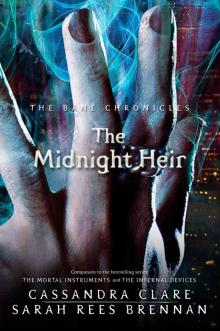 The Midnight Heir
The Midnight Heir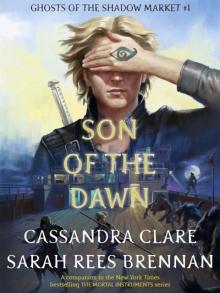 Son of the Dawn
Son of the Dawn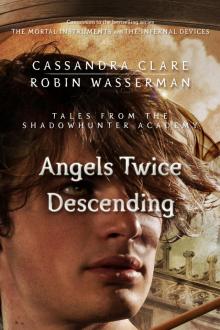 Angels Twice Descending
Angels Twice Descending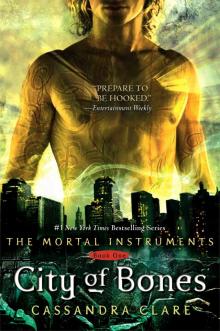 City of Bones
City of Bones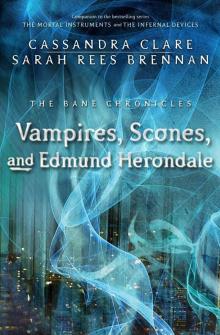 Vampires, Scones, and Edmund Herondale
Vampires, Scones, and Edmund Herondale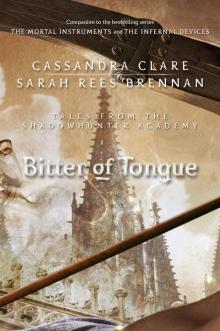 Bitter of Tongue
Bitter of Tongue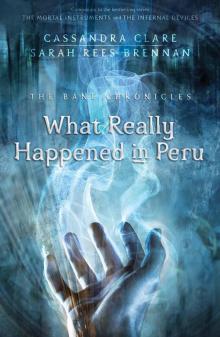 What Really Happened in Peru
What Really Happened in Peru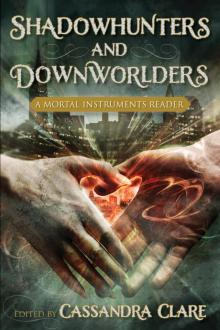 Shadowhunters and Downworlders
Shadowhunters and Downworlders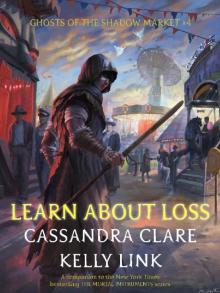 Learn About Loss
Learn About Loss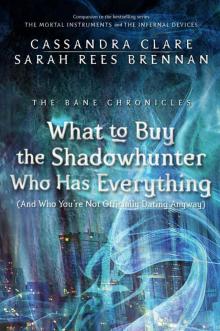 What to Buy the Shadowhunter Who Has Everything
What to Buy the Shadowhunter Who Has Everything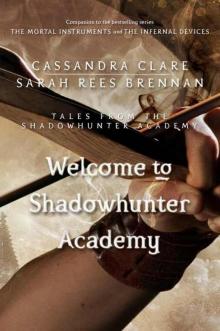 Welcome to Shadowhunter Academy
Welcome to Shadowhunter Academy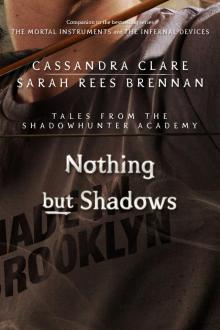 Nothing but Shadows
Nothing but Shadows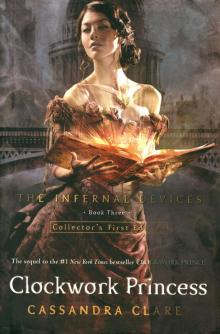 Clockwork Prince
Clockwork Prince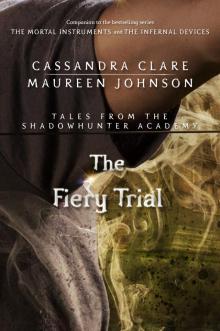 The Fiery Trial
The Fiery Trial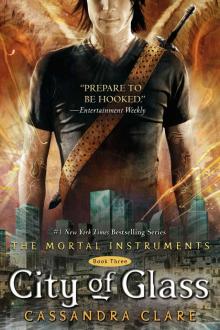 City of Glass
City of Glass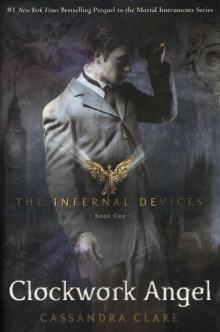 Clockwork Angel
Clockwork Angel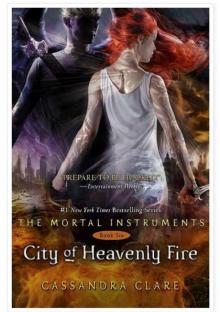 City of Heavenly Fire
City of Heavenly Fire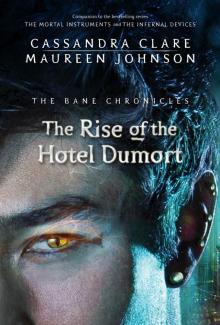 The Rise of the Hotel Dumort
The Rise of the Hotel Dumort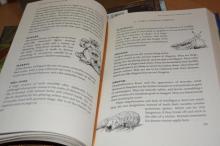 The Shadowhunters Codex
The Shadowhunters Codex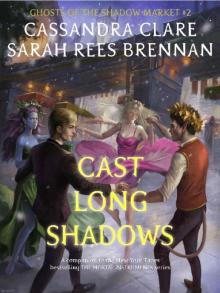 Cast Long Shadows
Cast Long Shadows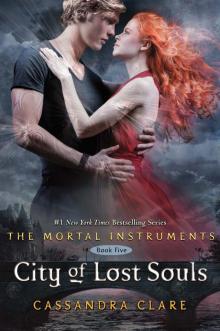 City of Lost Souls
City of Lost Souls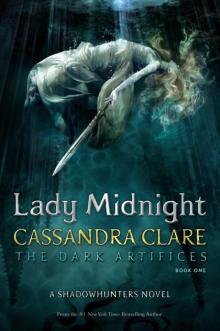 Lady Midnight
Lady Midnight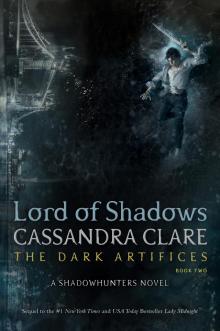 Lord of Shadows
Lord of Shadows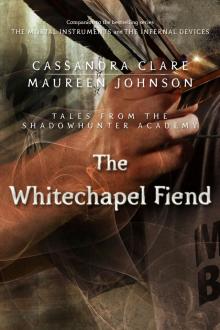 The Whitechapel Fiend
The Whitechapel Fiend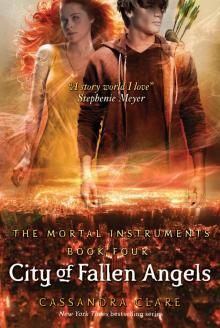 City of Fallen Angels
City of Fallen Angels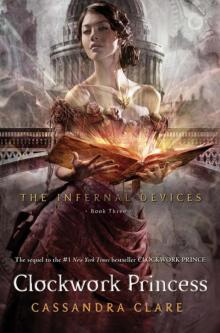 Clockwork Princess
Clockwork Princess Queen of Air and Darkness
Queen of Air and Darkness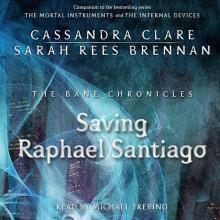 Saving Raphael Santiago
Saving Raphael Santiago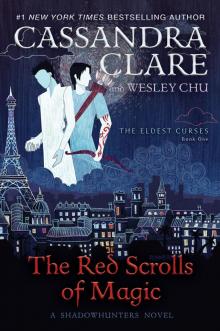 The Red Scrolls of Magic
The Red Scrolls of Magic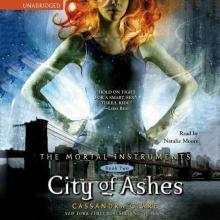 City of Ashes
City of Ashes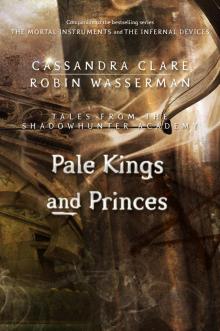 Pale Kings and Princes
Pale Kings and Princes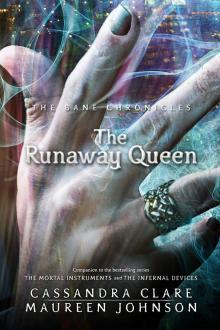 The Runaway Queen
The Runaway Queen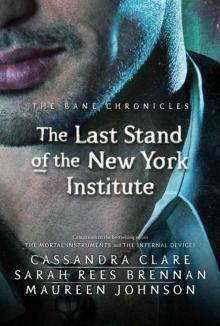 The Last Stand of the New York Institute
The Last Stand of the New York Institute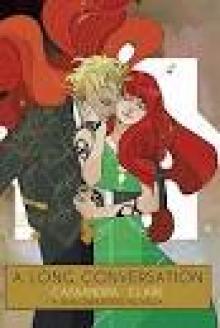 A Long Conversation (The Shadowhunter Chronicles)
A Long Conversation (The Shadowhunter Chronicles)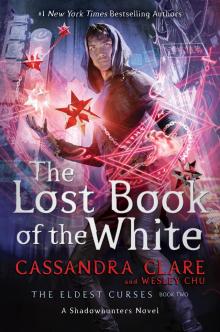 The Lost Book of the White
The Lost Book of the White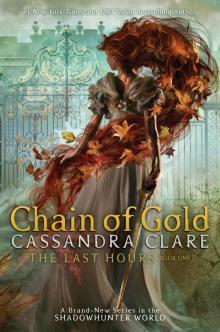 Chain of Gold
Chain of Gold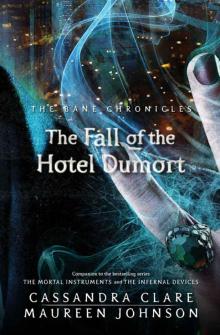 The Fall of the Hotel Dumort
The Fall of the Hotel Dumort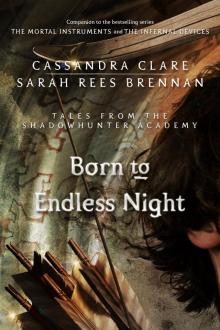 Born to Endless Night
Born to Endless Night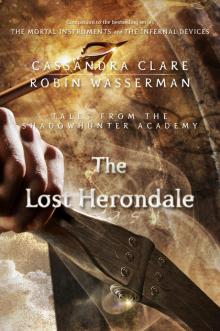 The Lost Herondale
The Lost Herondale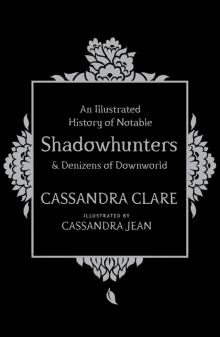 An Illustrated History of Notable Shadowhunters & Denizens of Downworld
An Illustrated History of Notable Shadowhunters & Denizens of Downworld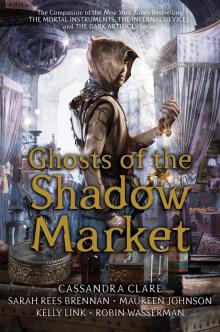 Ghosts of the Shadow Market
Ghosts of the Shadow Market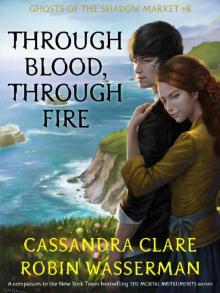 Through Blood, Through Fire
Through Blood, Through Fire Every Exquisite Thing
Every Exquisite Thing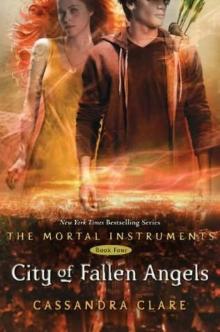 City of Fallen Angels mi-4
City of Fallen Angels mi-4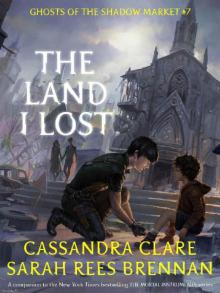 The Land I Lost (Ghosts of the Shadow Market Book 7)
The Land I Lost (Ghosts of the Shadow Market Book 7) Queen of Air and Darkness (The Dark Artifices #3)
Queen of Air and Darkness (The Dark Artifices #3)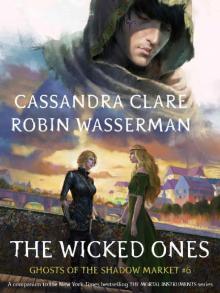 The Wicked Ones (Ghosts of the Shadow Market Book 6)
The Wicked Ones (Ghosts of the Shadow Market Book 6)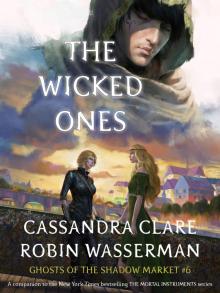 The Wicked Ones
The Wicked Ones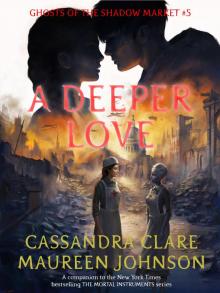 A Deeper Love
A Deeper Love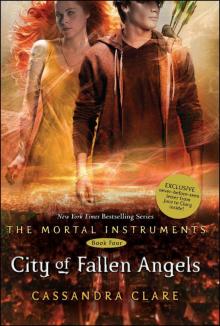 City of Fallen Angels (4)
City of Fallen Angels (4)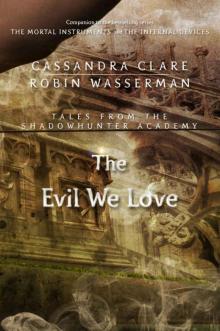 The Evil We Love (Tales from the Shadowhunter Academy Book 5)
The Evil We Love (Tales from the Shadowhunter Academy Book 5)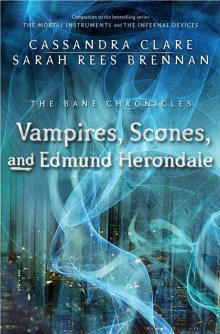 Vampires, Scones, and Edmund Herondale tbc-3
Vampires, Scones, and Edmund Herondale tbc-3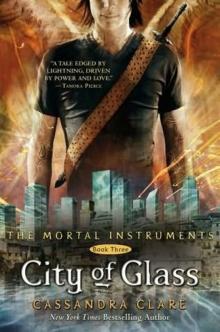 City of Glass mi-3
City of Glass mi-3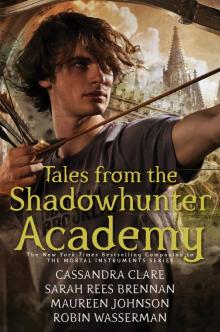 Tales from the Shadowhunter Academy
Tales from the Shadowhunter Academy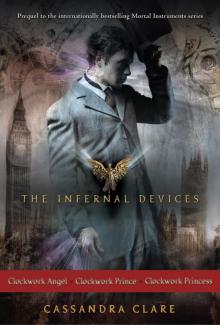 The Infernal Devices Series
The Infernal Devices Series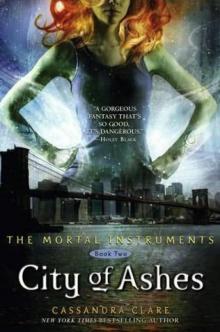 City of Ashes mi-2
City of Ashes mi-2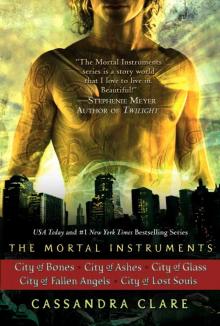 Cassandra Clare: The Mortal Instruments Series
Cassandra Clare: The Mortal Instruments Series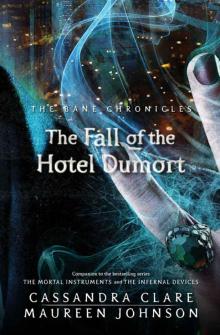 The Bane Chronicles 7: The Fall of the Hotel Dumort
The Bane Chronicles 7: The Fall of the Hotel Dumort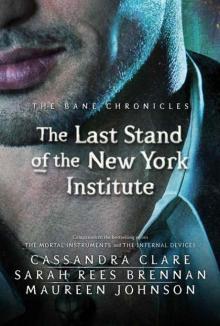 The Last Stand of the New York Institute (The Bane Chronicles)
The Last Stand of the New York Institute (The Bane Chronicles)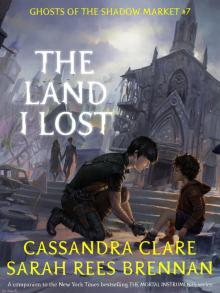 The Land I Lost
The Land I Lost![Saving Raphael Santiago - [Bane Chronicles 06] Read online](http://i1.bookreadfree.com/i1/04/03/saving_raphael_santiago_-_bane_chronicles_06_preview.jpg) Saving Raphael Santiago - [Bane Chronicles 06]
Saving Raphael Santiago - [Bane Chronicles 06]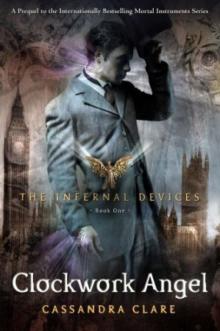 Clockwork Angel tid-1
Clockwork Angel tid-1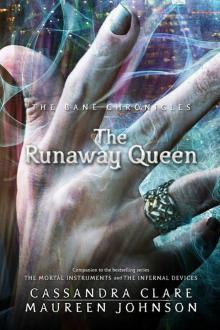 The Runaway Queen tbc-2
The Runaway Queen tbc-2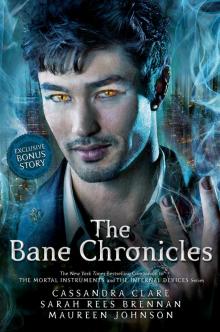 The Bane Chronicles
The Bane Chronicles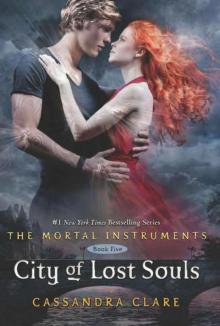 City of Lost Souls mi-5
City of Lost Souls mi-5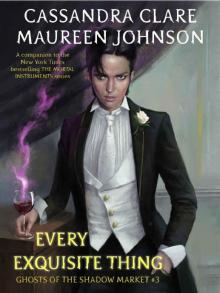 Every Exquisite Thing (Ghosts of the Shadow Market Book 3)
Every Exquisite Thing (Ghosts of the Shadow Market Book 3)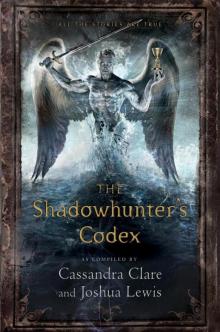 Shadowhunter’s Codex
Shadowhunter’s Codex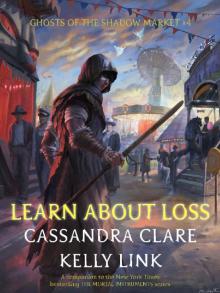 Learn About Loss (Ghosts of the Shadow Market Book 4)
Learn About Loss (Ghosts of the Shadow Market Book 4)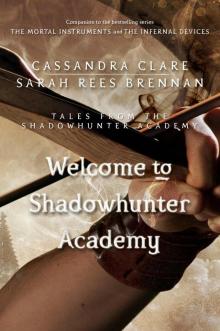 Welcome to Shadowhunter Academy (Tales from the Shadowhunter Academy Book 1)
Welcome to Shadowhunter Academy (Tales from the Shadowhunter Academy Book 1)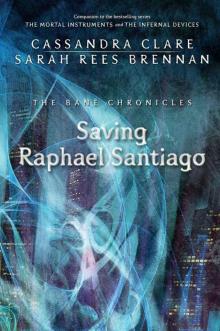 Saving Raphael Santiago tbc-6
Saving Raphael Santiago tbc-6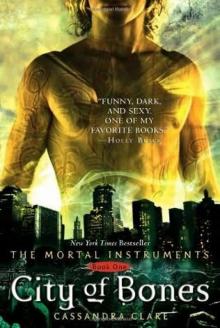 City of Bones mi-1
City of Bones mi-1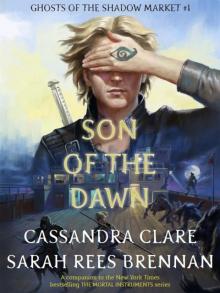 Ghosts of the Shadow Market Book 1_Son of the Dawn
Ghosts of the Shadow Market Book 1_Son of the Dawn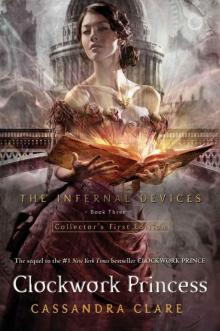 Clockwork Princess (Infernal Devices, The)
Clockwork Princess (Infernal Devices, The)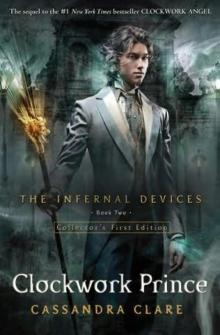 Clockwork Prince tid-2
Clockwork Prince tid-2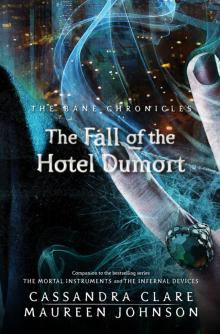 No Immortal Can Keep a Secret
No Immortal Can Keep a Secret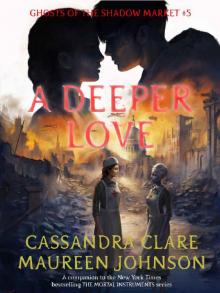 A Deeper Love (Ghosts of the Shadow Market Book 5)
A Deeper Love (Ghosts of the Shadow Market Book 5)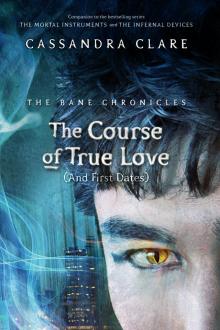 The Course of True Love (and First Dates)
The Course of True Love (and First Dates)